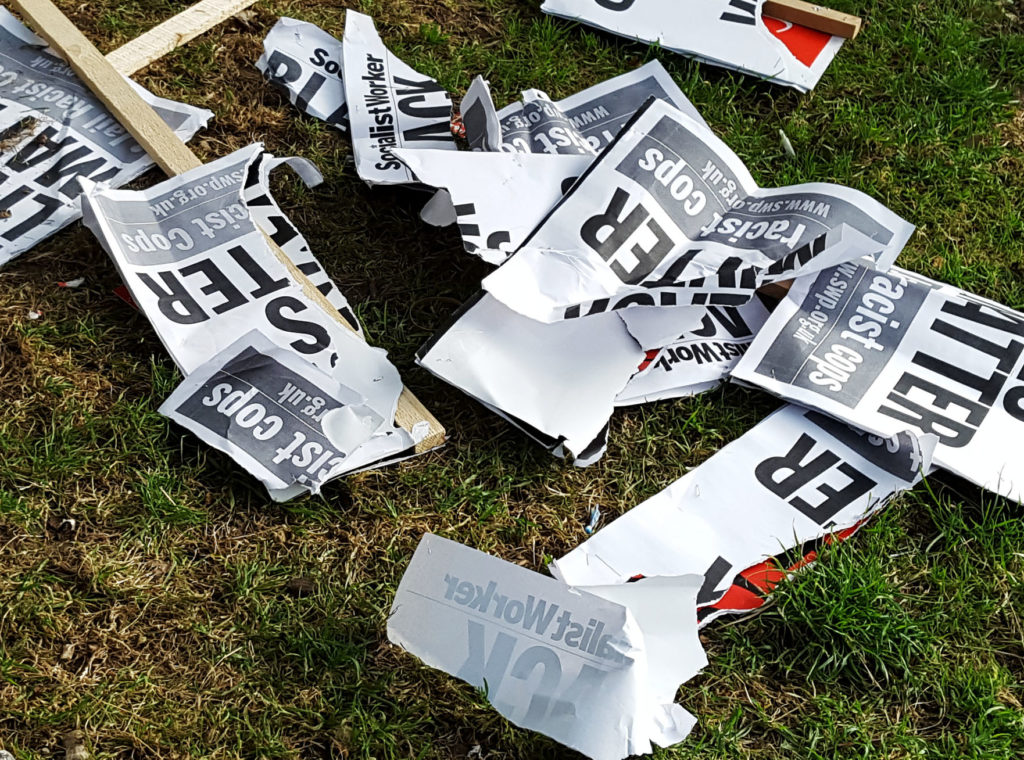The Socialist Workers Party (SWP) rape scandal emerged several years ago and resulted in hundreds of members resigning from the SWP (including 90% of its student members) over the handling of rape and sexual harassment by the former SWP National Secretary Martin Smith dating back to 2010, as well as the party attempting to cover up several other instances of rape within their ranks.
This is a short retelling of how a small group of people decided to collectivise our resistance to the presence of the SWP in organising spaces and at events – an activity largely inspired by the desire to stop reproducing our unsustainable, harmful & individualised attempts at such challenges.
It seems necessary with any writing on the SWP to foreground objections to their continuing existence with broader demands for accountability and harm reduction in social movements. The SWP is a violent formation, but it is neither exceptional or isolated – its kinds of behaviour are present in many other groups and practices. Many of us are already engaged in various accountability work in our organising, and wanted to better apply that approach to challenging the SWP too.
We decided to organise collectively following our experiences at the Shut Down LD50 demonstration in Hackney. The demonstration was called by a local collective, and many of us had turned up unprepared for a large and unmistakable SWP presence – under their rejuvenated Unite Against Fascism front. Several of us, independently, challenged SWP members there with their placard bundles and literature and were, variously, physically assaulted, loudly accused of being racists, and told we were splitting the left – a claim that came from onlookers too who weren’t necessarily SWP members. Our challenges were clearly completely unsustainable and easily brushed off by the SWP.
One of us described an early attempt at taking this more collective approach: “My first experience of collective action against the SWP was spontaneous. They came around fly-posting while we were on a street stall. Afterwards, we went together and swept the area, “improving” the SWP posters with a marker pen. The difference between exhausting and dispiriting confrontation, and a joyous vandalism session with a comrade could hardly be more pronounced.”
Our first real attempt to challenge the SWP collectively came when the EDL planned a march on Whitehall. From experience, we knew that the SWP would use the counter demonstration as a chance to recruit and control the event through another prominent front, Unite Against Fascism. We prepared some leaflets to hand out – warning people of the nature and dangers of the SWP – made a banner to carry, and agreed to meet up before the event to discuss how each of us felt about different levels of confrontation on the day (our presence alone often being enough to engage verbal and physical intimidation) and how we would be accountable to each other while maintaining some basic boundaries of safety. Unfortunately, within 10 minutes of this attempt, two of our number were arrested (perhaps on the advice of someone defending UAF who was seen speaking with police beforehand). This wasn’t supposed to happen of course but, wonderfully, the remaining group of people offered arrestee support for those arrested, and some time later the charges were finally dropped. It was clear that we still had to think more carefully about this project.
Over the following months, our group met repeatedly – to share food and ideas, to build trust and understanding. Some of us also began organising together more on our existing political projects. We noticed that a collective attempt to challenge the harm caused by the SWP tended to lead us to seek out fewer immediate physical confrontations, which we’d found increasingly harmful. The collective approach to this planning allowed us to express concerns about our safety and work on our accountability to each other for the harm we might cause one another; it was also instrumental in building a more sustainable approach. As sexual violence, especially in our own political spaces, makes many of us intensely angry, within these intimate structures, the self destructive anger which many of us experienced in these situations was made more productive by our togetherness.

We increasingly attempt to undermine the SWP through their ability to organise – much of which is based on finding places where they recruit members and gather data from people unaware of their history. In the last year, our small group has undertaken a number of actions together. One of the first was to produce some visual tools (stickers, posters, leaflets and flyers) to spread information about the group. Much of these are based on the look of SWP graphics themselves – including their most prominent fronts (the ones you always see in photographs of placards at demonstrations, though hopefully not for much longer). We’ve been on a number of leafleting sessions together. We’ve met up to sticker venues before an SWP controlled event takes place, or in an area we’ve noticed them attempting to recruit in.
One particularly successful action involved leafleting people at Brixton station during one of the SWP regular Friday evening stalls. We spent a few minutes before sketching out our boundaries and what we expected to achieve, then spent roughly 90 minutes standing a reasonable distance from the stall with posters and handed out leaflets with details of the SWP’s history and links to research more online. We completely ignored all attempts by the increasingly angry SWP members at the stall to engage us with their attempts to smear and antagonise us. Eventually we retired to a nearby coffee shop to discuss how we felt things had gone, and what had been upsetting for us (being repeatedly misgendered and verbally abused for over an hour is not a pleasant experience, and it was important to be able to talk about the difficulties we’d experienced). It was really pleasing to finally be able to challenge the SWP without feeling that it was followed by days or weeks to recover from the experience.
So, we look back at a year where we feel we challenged a group whose very existence is harmful to others, in a more sustainable way. It’s been really lovely to build a collective dynamic of relative safety from which to challenge this group, and it’s made our other forms of accountability work more well-sustained and informed too. We hope that others might begin to further replicate this work – which we have found increasingly frustrating for SWP members to counter. We’ve also been touched and encouraged to see the visual propaganda we made used far more widely than our immediate circles, where it has popped up in places such as Yarl’s Wood abolition demos, on university campuses around the country and at the Labour Party Conference. We hope to continue to challenge violence and harm wherever we see it, we hope others will continue to do the same.
by an affinity group that hates the SWP | fuckswp.tumblr.com
